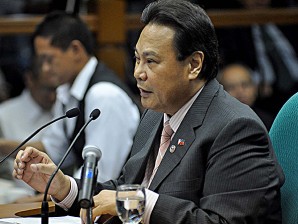Corona: No 82 dollar accounts, only 4
In a PowerPoint presentation, based on the analysis by a team of accountants of earlier computer graphic slides shown to the Senate tribunal by Ombudsman Conchita Carpio Morales, Chief Justice Renato Corona on Tuesday disputed claims he had amassed $10 million to $12 million in bank accounts.
Corona told the Senate impeachment tribunal that many of the 82 bank accounts Morales mentioned in her own PowerPoint presentation last week had been closed or transferred to other accounts. He said there were only four dollar accounts by December 2011 and summarized the accountants’ analysis this way:
- BPI-Acropolis branch, all seven accounts were closed in 2004 and 2005, and transferred to BPI-Tandang Sora and PSBank-Cainta
- BPI-Tandang Sora, all 18 accounts were closed from 2004 to 2007, and transferred to BPI-San Francisco Del Monte, and PSBank-Cainta.
- BPI-San Francisco Del Monte, all 34 accounts were closed from 2007 to December 2011.
- BPI-Investment Management Inc. account was sourced from the BPI-San Francisco Del Monte “main account” and was closed on Dec. 19, 2011, and the funds were transferred to the “main account.”
- The PSBank-Cainta account was closed between August and October 2008, and the funds were transferred to PSBank-Katipunan.
“For Allied Bank, these placements include Citibank and two Deutschbank accounts. The alleged AMLC (Anti-Money Laundering Council) records showed that most of the Allied Bank accounts were closed and the funds thereof transferred to the main account and this main account was closed in December 2011,” he said.
In the end, as of December only four dollar accounts were left in BPI-San Francisco Del Monte, Allied Bank, and PSBank-Katipunan.
“That’s all that’s left of the big pie of Morales,” Corona said. “I have a question for the Ombudsman. Mrs. Ombudsman, does your conscience allow you to sleep, if you have one? You know I don’t have $10-$12 million accounts. Why are you spreading this in public?”
Article continues after this advertisementPrivate prosecutor Mario Bautista objected to these “personal aspersions” on individuals, but Senate President Juan Ponce Enrile allowed Corona to continue, saying he “knows the law and the rules of evidence.”
Article continues after this advertisementCorona said he and his wife had been converting their income into dollars in the late 1960s when the exchange rate was P2-$1. He said he started working in 1968.
“I had a good paying job, especially when I became a lawyer. All our savings were converted into dollars. Why in US dollars? You won’t suffer any loss in US dollars. It’s very stable if compared to Philippine peso,” he said, pointing the rate has risen seven times since then. “Since we did not touch the interest, our investments grew.”
These funds, he stressed, have a “long history.”
“I repeat, honorable judges, I do not have $10-$12 million as alleged by Ombudsman Morales. I also don’t own 82 accounts. All that we have came from clean and honest work, and sheer hard work. I did not steal anything from the government; not a single cent,” he said, turning to look at the panel of prosecutors. He said he religiously paid his taxes.
“Am I hiding something? I’m looking straight in your eyes, I did not hide something. If I hid something, I would not have declared the money under my name,” he said.
Corona admitted he had owned three peso deposits which he said he did not declare these because these were “co-mingled” funds, consisting of the P34.7-million sale of the property of the Basa-Guidote Enterprises Inc. (BGEI) in Manila in 2001, as well as the savings of the Corona couple and children.
He said his mother also entrusted to him her peso account when she was diagnosed with colon cancer in 1990, but did not mention the amount. He turned teary-eyed when narrating that a part of the fund was allotted for his mother’s funeral expenses, as well as the medication of an elder brother.
Their children Carla Corona-Castillo, Francis and Charina also contributed to the funds.
